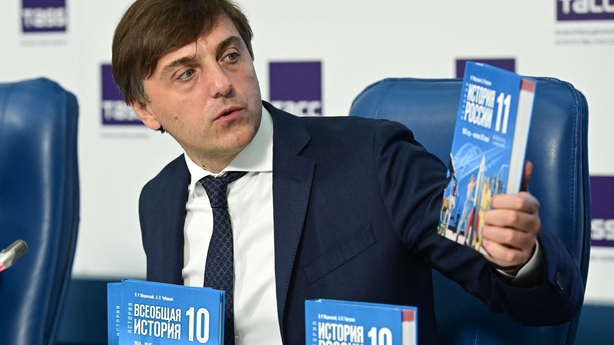Written in record time and praising the army: Russia revealed new history textbooks yesterday ahead of children returning to the classroom for a second school year with troops fighting in Ukraine and ruptured ties with the West.
The Kremlin has tightened its control over the historical narrative in schools under President Vladimir Putin, a trend that has hugely accelerated since Russia invaded Ukraine last year.
The conflict has increasingly been presented to the youngest Russians as part of Moscow's historical mission.
Presenting the new book aimed for the 11th grade -- 17-year-olds -- at a press conference in Moscow, Education Minister Sergei Kravtsov said the material was written in just a few months and aimed at "conveying the aims (of the Ukraine offensive) to school children".
"The tasks of demilitarisation and de-Nazification, so that schoolchildren are convinced that this is really the case," he said, repeating Mr Putin's stated aims when he sent troops to Ukraine last February.
The books features Russia's bridge linking annexed Crimea to the mainland on its cover, a symbol of Mr Putin's rule that has been attacked several times during the conflict.
It covers the period between 1945 to the 21st century and Mr Kravtsov said it will be "in all schools on September 1".
The book was written in "just under five months", Mr Kravtsov said.
"After the end of the special military operation (in Ukraine), after our victory, we will further supplement this book," he added.

Presidential aide Vladimir Medinsky, who is known for a conservative view of history and has been criticised by some historians, praised the speedy production.
"No textbook has ever been created in our country in such a short time," he said. "The authors wrote it practically with their own hand."
He said the textbook presents "the state's point of view".
The book features sections on Russian soldiers "saving peace" in 2014 when Moscow annexed the Crimea peninsula from Ukraine.
It also denounces Western sanctions, describing them as worse than Napoleon, who marched on Russia in 1812.
Russia has unleashed an unprecedented crackdown on dissent during its Ukraine invasion, which has extended into schools.
In April, a Russian girl was taken away from her father after she drew a picture in support of Ukraine at school.
After the start of the invasion, a new subject -- "Talks on what is important" -- was introduced in Russian schools, meant to instil patriotism in children.

